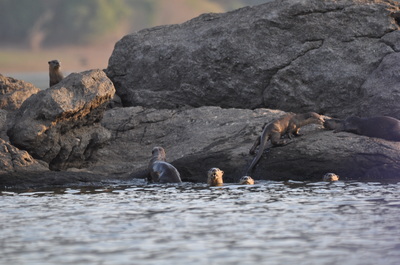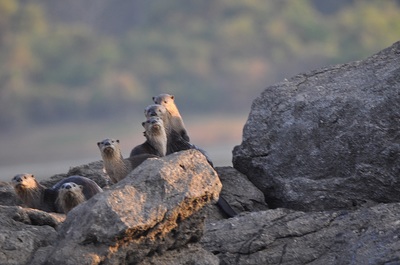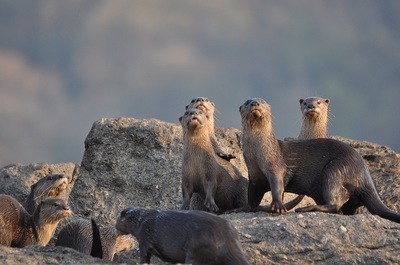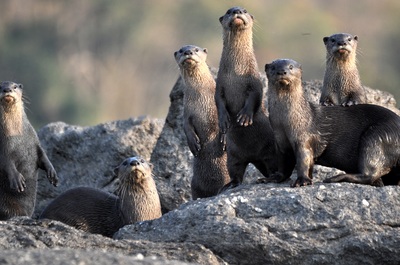|
Sunday morning…I was sitting in the balcony reading the newspapers. GNB was singing “Dikku Theriyatha Kaatil”, in Ragamalika, in his inimitable style in the background. It is one of Bharathiyar’s evocative songs which details the travails of a person who is lost in a fearsome forest, pining for direction to a way ahead, epitomizing the perennial human quest for salvation amidst anguish and despair. It seemed particularly timely as I was reading about the devastating earthquake in Nepal. The earthquake would have caught people by surprise, some in the middle of their work, others going about their daily lives without any qualms as to what the next hour could be….till it struck. People's lives have been transformed within minutes, sometimes even seconds. As I watch the events unfold, I am struck once again by the fragility of our human life. From the Earth's point of view, this is like the shrug of a giant when asleep. Yet for us, that shrug, that shift, can mean life or death in an instant, or at least a complete transformation of everything we held to be unwavering until that very moment. In times like this, we are overwhelmed with fear about the insubstantiality of our lives.
Dr Atul Gawande writes about this so hauntingly in his book “Being Mortal”. It starts with an anecdote from Tolstoy’s Death of Ivan Ilyich. Tolstoy writes “What tormented Ilyich most was the deception, the lie, which for some reason they all accepted, that he was not dying but was simply ill, and he only need keep quiet and undergo treatment and something very good would result”. But he was in tormented by overwhelming fears of approaching death. “He longed to be petted and comforted…he knew that what he longed for was impossible, but he still longed for it”. Gawande is reflective and at times quietly critical about the way modern medicine responds to those who are terminally ill. He describes the journey from being independent to needing assistance to full time care that the elderly and their families have to cope with. Many of us would have faced similar situations in personal or professional lives. Quite often “our reverence for independence takes no account of the reality of what happens in life: sooner or later, independence will become impossible” (p. 22). What lends strength to the book are the many personal stories of people struggling with their mortality. With remarkable insight he writes, “for human beings, life is meaningful because it is a story. A story has a sense of whole, and its arc is determined by the significant moments, the one where something happens…and in stories, ending matters” (p.238). Some are very moving accounts, some are inspiring - none more so than Dr. Gawande's own experiences as he deals with his physician father's decline and eventual death. It is a poignant and moving account. Having tended to three elders who spent the last days of their lives at home his accounts deeply resonated within me. Dr Gawande is more eloquent in describing these moments, “I never expected that among the most meaningful experiences I would have as a doctor-and, really, as a human being-would come from helping others deal with what medicine cannot do as well as what it can” (p.260). Dr Gawande makes a journey to Benares to immerse his father’s ashes (as per his last wish) and he writes, “Although I didn’t feel my dad was anywhere in that cup and a half of gray, powdery ash, I felt that we’d connected him to something far bigger than ourselves…Floating on that swollen river, I could not help sensing the hands of many generations connected across time. In bringing us there, my father had helped us see that he was part of a story going back to thousands of years-and so were we” (p.262). As I was re-reading the book, my eyes welled with tears many times. Suddenly there was a flash of a delicate blue in the tree near the balcony. A kingfisher! A poem by Ann Lewis came to mind… Prayer is like watching for The kingfisher. All you can do is Be there where he is like to appear, and Wait. Often nothing much happens; There is space, silence and Expectancy. No visible signs, only the Knowledge that he’s been there And may come again. Seeing or not seeing cease to matter, You have been prepared. But when you’ve almost stopped Expecting it, a flash of brightness Gives encouragement.
7 Comments
The quest for happiness is perennial...
On the occasion of the launch of the Sanmati Trust, I spoke briefly on this journey. And here's the link to the video...with all its technical glitches!  It was a glorious evening with the setting sun framing the backwaters of Chimmony with brilliant hues. We were on a boat returning after an hour long sojourn and I was keeping half an eye out for otters. I knew my chances of seeing them might be minimal. Suddenly I noticed a group of otters, just in front of us in the river barking like dogs at us with khar kharr sounds. Neer-nai as they are often referred to as might appear drab brown at a casual glance. But these sleek furry little water-wanderers were graceful as they ambled along the crevices of the rocks. Among them there was one staring at us upright, standing with two forelimbs hanging and another anchoring amidst the rocks drying the wet fur. Others were coming out with their snouts just visible, making waves of whirls in the calm water. They were paddling with their hind legs, their heads on the surface and tails streaming behind them creating vortex of whirlpools. Their barking did not stop even while swirling. We spent a few minutes watching them before they quietly slinked away. These Smooth Coated Otters are closely related to the Giant Otters of South America and are Asia’s largest otters. They are highly social and are often seen in packs numbering upto 15. Being social animals, they are a delight to watch. They mostly feed on fish (more than 90% of their diet is fish) and that makes them quite unpopular among fishermen. Unfortunately poaching otters for their pelt continue to decimate both fisheries and otter populations across most Indian rivers. Otter pelts along with tiger pelts make their way across the borders, usually bound for markets in China. Interestingly, trained smooth-coated otters are used by fisherman to herd fish into nets. They are listed as vulnerable on the IUCN Red list13. The population is threatened by loss of wetland habitats, poaching, and contamination of waterways by pesticides. Smooth-coated otters are protected in India under the Wildlife (Protection) Act, 1972, and are listed as endangered. As the dusk set in, the image of these frolicking otters in the fading light was deeply etched in memory. Poets have described the scene more eloquently. For instance Seamus Heaney (perhaps the greatest Irish poet after WB Yeats), wrote a wonderful poem describing the beauty and grace of one of natures most under appreciated creatures, the otter. When you plunged The light of Tuscany wavered And swung through the pool From top to bottom. I loved your wet head and smashing crawl, Your fine swimmer's back and shoulders Surfacing and surfacing again This year and every year since. I sat dry-throated on the warm stones. You were beyond me. The mellowed clarities, the grape-deep air Thinned and disappointed. Thank God for the slow loadening, When I hold you now We are close and deep As the atmosphere on water. My two hands are plumbed water. You are my palpable, lithe Otter of memory In the pool of the moment, Turning to swim on your back, Each silent, thigh-shaking kick Re-tilting the light, Heaving the cool at your neck. And suddenly you're out, Back again, intent as ever, Heavy and frisky in your freshened pelt, Printing the stones. However, there are some who hold the view that the poem is not just about the otter. The otter reminded him of his wife swimming. Lonesome for her, he celebrated her grace, the grace of the otter, and the presence of grace in the world. Try reading the poem with an image of a woman diving into a swimming pool in mind, instead of an otter. Does it work?! |
Dr Raguram
Someone who keeps exploring beyond the boundaries of everyday life to savor and share those unforgettable moments.... Archives
May 2024
Categories |




 RSS Feed
RSS Feed